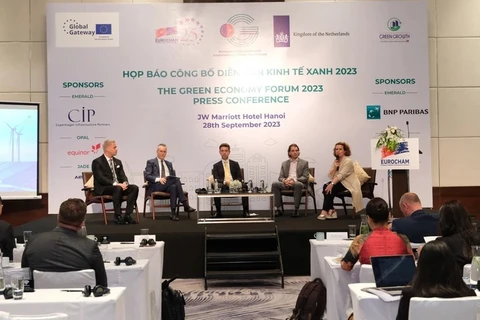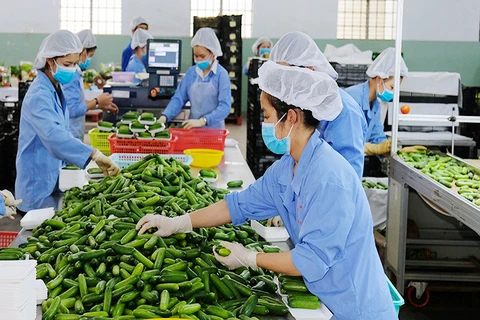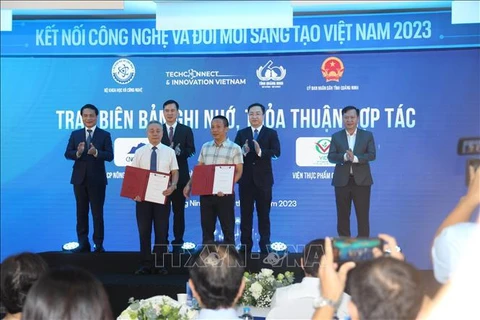Hanoi (VNA) - Vietna-Japan cooperation in the development of green growth, a cornerstone in the two nations' future economic relations, still has enormous untapped potential, heard participants at a seminar themed "Vietnam-Japan cooperation towards green growth" in Hanoi on September 12.
The seminar is part of activities leading up to the 50th anniversary of the establishment of diplomatic relations between Vietnam and Japan (September 21, 1973 – September 21, 2023).
The seminar was co-organised by the Vietnam News, the country's English language daily newspaper under the Vietnam News Agency, and the Ministry of Agriculture and Rural Development.
Attending the seminar are delegations from various Vietnamese ministries and sectors such as the Ministry of Planning and Investment, the Ministry of Foreign Affairs, the Ministry of Industry and Trade; representatives from the Vietnamese Embassy in Japan, the Japanese Embassy in Vietnam, the Japan International Cooperation Agency (JICA), the Japan External Trade Organisation (JETRO); leaders of several provinces and cities in Vietnam, along with experts and businesses from both countries.
The event is a chance for the participants to share perspectives on green growth, opportunities and challenges in realising Vietnam's Green Growth Strategy for the 2021-2030 period and the vision for 2050, the significance of Japan's support for green growth in the Southeast Asian country, as well as suggest and recommend solutions to help implement the strategy. The seminar also serves as a platform for experience sharing and idea exchanges.
Speaking at the seminar, Pham Quang Hieu, Vietnamese Ambassador to Japan, said Vietnam-Japan bilateral relationship is at its height in the history of the two nations, deserving of an extended strategic partnership built on sincerity, trust and mutual support.
"In the medium and long term toward the goals of 2030-2050, both countries have significant potential for further cooperation in green technology, energy transition and bilateral research collaboration in applying Japanese technology that aligns with Vietnam’s needs and transition roadmap,” he said.
General Director of the Vietnam News Agency Vu Viet Trang said through the seminar, she believes that Japanese organisations and enterprises will gain a better understanding of Vietnam's green growth policy priorities and strategies, both at the national and local levels, opening up new opportunities for cooperation in areas where both sides have potential and strengths.
 General Director of the Vietnam News Agency Vu Viet Trang make a speech in the event. (Photo: Vietnam+)
General Director of the Vietnam News Agency Vu Viet Trang make a speech in the event. (Photo: Vietnam+) As of August 2023, Japan has 5,168 valid projects with a total registered investment capital of over 71 billion USD. Japan currently ranks third among 143 countries and territories investing in Vietnam.
The Japan External Trade Organisation in Vietnam emphasized that focusing on green growth is crucial for addressing pressing issues in Vietnam, including water quality, air pollution, waste management, recycling, energy efficiency and carbon emissions. JETRO advised the Vietnamese Government to implement stricter environmental regulations, expand manufacturers' environmental responsibilities and accelerate the transition to renewable energy sources.
Meanwhile, the Japan International Cooperation Agency reaffirmed its close collaboration with the Ministry of Natural Resources and Environment to enhance Vietnam's capacity for carbon emission reduction, focusing on water resource management; and partnership with agriculture companies in improving living conditions and deploying modern technologies to mitigate the impacts of climate change and natural disasters.
According to the World Bank's data, Vietnam ranks 8th among the top 10 countries with the highest investment in renewable energy in the world, with a total capital of 7.4 billion USD. The country's renewable energy development rate currently ranks 4th in the world.
According to Boston Consulting Group (BCG), in terms of boosting green growth, the country's transition to wind and solar power alone could contribute 70-80 billion USD to GDP annually and create about 90,000-105,000 jobs; the hydrogen ecosystem based on renewable energy could contribute 40-45 billion USD to GDP annually and create 40,000-50,000 jobs./.
























